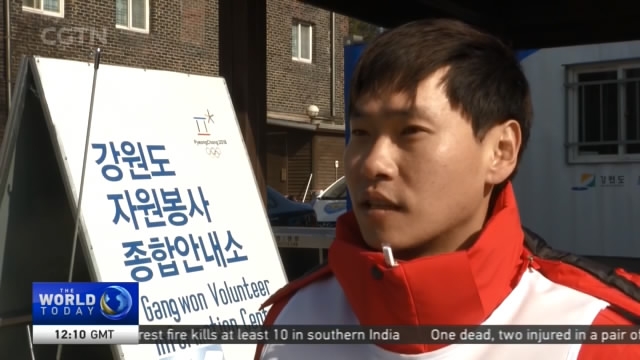
20:25, 13-Mar-2018
Pyeongchang Paralympics: 2018 Winter Paralympics is underway in South Korea

The 2018 Winter Paralympics are now underway in Pyeongchang, South Korea. For disabled athletes and fans attending the Games, navigating the various events can be a challenge. Shane Hahm takes a look at what services are being offered to overcome those challenges.
When Lee Ki-sang was growing up he lived near a school for the deaf. He would interact with deaf friends in the neighborhood and eventually joined a sign language club in college. So when he heard his hometown was hosting the Winter Paralympics, he seized the opportunity to volunteer.
LEE KI-SANG SIGN LANGUAGE INTERPRETER "The most common question I get from visitors has to do with area information. For instance, questions like 'what time do events begin' and 'how do you get to venues'. The majority of deaf visitors that seek help from us are Korean and many are proud that the Paralympics are happening in Korea."
More than a dozen sign language volunteers roam the Paralympic venues to offer help. In addition to on-site interpretations, they also offer sign language through video chat.
YOON YOUNG-SOO PARALYMPIC FAN "Without an interpreter it's difficult to understand what is happening. But with an interpreter, the message is relayed and I can enjoy the Paralympics better."
SHANE HAHM PYEONGCHANG "Sign language is recognized as an official language in South Korea along with Korean, according to a law that went into effect in 2016. But when local broadcasters omitted sign language during televised coverage of the Paralympic Opening Ceremonies, it caused a public uproar and reminded many here that more needs to be done to accommodate the disabled."
South Korea passed the Disability Discrimination Act in 2007 which defends basic rights for the disabled and prohibits unfair treatment. The law requires public building accommodations and equal opportunities in the workplace. But according to human rights groups, the disabled still face more discrimination than any other social group in the country.
LEE KI-SANG SIGN LANGUAGE INTERPRETER "The Paralympics are not just Olympics for the disabled, and the Olympics are not just for the non-disabled. Things like interpretation services and wheelchair accessible buses must also be provided during the Olympics so that the disabled can also enjoy the event."
Lee says basic rights for the disabled must be guaranteed and not just recognized. He says it's the duty of not just the government, but by everyone willing and able.

SITEMAP
Copyright © 2018 CGTN. Beijing ICP prepared NO.16065310-3
Copyright © 2018 CGTN. Beijing ICP prepared NO.16065310-3